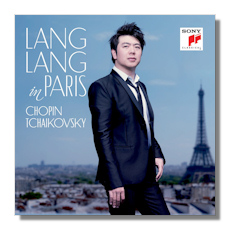
The Internet's Premier Classical Music Source
Related Links
-
Chopin Reviews
Tchaikovsky Reviews - Latest Reviews
- More Reviews
-
By Composer
-
Collections
DVD & Blu-ray
Books
Concert Reviews
Articles/Interviews
Software
Audio
Search Amazon
Recommended Links
Site News
 CD Review
CD Review
Lang Lang in Paris

- Frédéric Chopin:
- Scherzo #1 in B Minor, Op. 20
- Scherzo #2 in B-Flat Minor, Op. 31
- Scherzo #3 in C-Sharp Minor, Op. 39
- Scherzo #4 in E Major, Op. 54
- Piotr Ilyitch Tchaikovsky: The Seasons, Op. 37a
Lang Lang, piano
Sony Classical 88875117582 2CDs 41:22 + 45:07
Also available on 2CD+DVD Deluxe Edition 88875117612:
Amazon
- UK
- Germany
- Canada
- France
- Japan
- ArkivMusic
- CD Universe
- JPC
Lang Lang's Chopin can be a little quirky at times, notably with fortes and pianos slightly exaggerated and tempo choices sometimes showing sharp and sudden contrasts in pacing. Indeed, in the Scherzo #1 notice the deftly abrupt racing ahead (from 00:09) and the emphatic chords that slow the breathless pacing (00:27). And it all works so well and with elegance even when Lang plays with muscle and heft, as he does so often throughout the disc. His phrasing of the slow music in the trio is very sensitive, even if his dynamics sometimes tilt a bit too much to the soft side. The Scherzo #2 is powerful and dramatic in the outer sections and beautifully poetic in the inner portions. Yes, he can become quirky and finicky in places, but Lang always seems to make his way work, and in the bargain lets you see the work from a slightly different and quite valid vantage point. His ending, by the way, is thrilling.
Lang comes across as perhaps a bit too percussive in the opening and closing of the Third Scherzo. But his phrasing of the stately D-flat major theme is sensitive and well imagined and overall his account, aggressive as it arguably is in the faster music, is quite convincing. Lang's tempos for the Scherzo #4 are somewhat on the expansive side, mainly because he phrases the C-sharp minor trio music very slowly. Yet, once again he makes an excellent case for his tempo choices and for his interpretation in general. He has all the technique a pianist could want and a grasp of Chopin's idiom that make him among the composer's finest interpreters today. Yes, he has his detractors, some of whom call him Bang-Bang, but he is clearly a pianist whose artistry seems to grow with each passing year. As for the competition in the Scherzos, Ashkenazy on Decca is fine if you prefer a faster version, and Glemser on Oehms is quite superb in his middle-of-the road approach.
By the way, in regard to the album's title – Lang Lang in Paris – the notes go on at some length to link both Chopin and Tchaikovsky to Paris, and also mention that this is the pianist's first recording made in the French capital. It was recorded in the Bastille Opera House in May & June 2015. A DVD featuring the same repertory – Lang Lang Live in Versailles – will be released soon on Sony, maybe even by the time you read this.
As for Tchaikovsky's The Seasons, Lang seems slightly on the brisk side except for April, May and June, and overall he is less quirky and more steady. That said, he is still imaginative and fully convincing in these twelve pieces. January is lovely in its phrasing and seemingly perfectly judged dynamics, and just listen to Lang's festive and sassy February, one of the more colorful accounts of this Shrovetide Festival depiction that you're likely to hear. Lang's March is appropriately gloomy in the outer sections but manages to take on an almost playful character in the interior portion. The pianist handles the somewhat brighter but still reflective and gentle character of the next three pieces with a knowing grasp of Tchaikovsky's often bitter-sweet lyrical manner. Lang's July is colorful and confident, while his August whizzes by busily in the outer sections but becomes brooding in the middle section, rightly so. Lang wisely doesn't play down the bombast in September and he again deftly captures Tchaikovsky's lyrical and heart-on-sleeve side in his brooding account of October, perhaps the best piece of the dozen. Lang's last two performances are brilliant: he makes November ebullient and playful and December's waltz character is utterly charming in its lightness and balletic manner, thanks to the pianist's subtle dynamics and imaginative rubato. In many ways, Lang's Tchaikovsky is more subtle and convincing than his Chopin, which is itself quite good. Pletnev, Ashkenazy and many others have fine accounts of this collection of pieces but I'm quite content to stay with Lang, at least for now. Sony's sound reproduction is clear and well balanced. Highly recommended.
Copyright © 2015, Robert Cummings





















